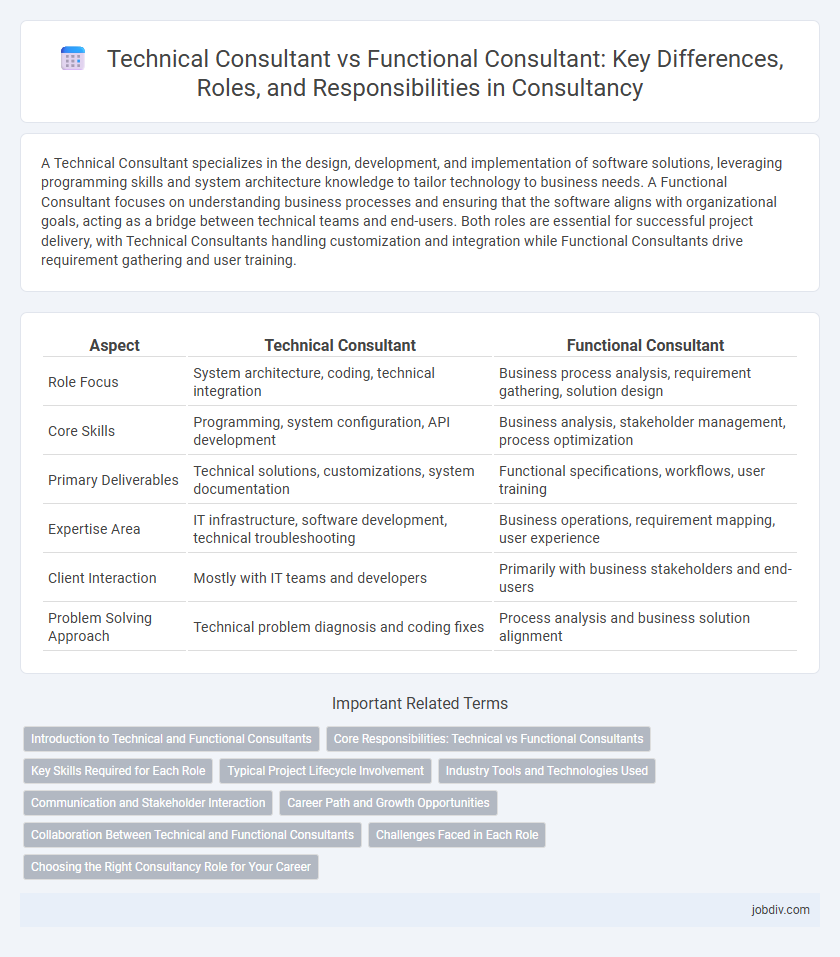A Technical Consultant specializes in the design, development, and implementation of software solutions, leveraging programming skills and system architecture knowledge to tailor technology to business needs. A Functional Consultant focuses on understanding business processes and ensuring that the software aligns with organizational goals, acting as a bridge between technical teams and end-users. Both roles are essential for successful project delivery, with Technical Consultants handling customization and integration while Functional Consultants drive requirement gathering and user training.
Table of Comparison
| Aspect | Technical Consultant | Functional Consultant |
|---|---|---|
| Role Focus | System architecture, coding, technical integration | Business process analysis, requirement gathering, solution design |
| Core Skills | Programming, system configuration, API development | Business analysis, stakeholder management, process optimization |
| Primary Deliverables | Technical solutions, customizations, system documentation | Functional specifications, workflows, user training |
| Expertise Area | IT infrastructure, software development, technical troubleshooting | Business operations, requirement mapping, user experience |
| Client Interaction | Mostly with IT teams and developers | Primarily with business stakeholders and end-users |
| Problem Solving Approach | Technical problem diagnosis and coding fixes | Process analysis and business solution alignment |
Introduction to Technical and Functional Consultants
Technical consultants specialize in system architecture, software customization, and coding to tailor technology solutions that align with business requirements. Functional consultants focus on understanding business processes, gathering requirements, and translating them into functional specifications that guide technology implementation. Both roles collaborate to ensure seamless integration of technical capabilities with organizational objectives, optimizing project success.
Core Responsibilities: Technical vs Functional Consultants
Technical consultants specialize in designing and implementing IT solutions, focusing on system architecture, programming, and integration tasks. Functional consultants analyze business processes, gather requirements, and customize software to align technological tools with organizational goals. Both roles collaborate to ensure seamless deployment and optimal system performance tailored to user needs.
Key Skills Required for Each Role
Technical consultants require proficiency in programming languages, system architecture, and database management to design and implement customized IT solutions. Functional consultants need strong business process knowledge, requirement gathering, and communication skills to align technology with organizational goals. Expertise in analytical thinking and stakeholder management is essential for both roles to effectively bridge the gap between technical systems and business needs.
Typical Project Lifecycle Involvement
Technical consultants typically engage during the system design, development, and implementation phases, providing expertise in software customization, integration, and technical troubleshooting. Functional consultants are more involved in the requirements gathering, process analysis, user training, and post-implementation support phases, ensuring that the solution aligns with business needs. Both roles collaborate closely during testing and deployment to ensure seamless project delivery and user adoption.
Industry Tools and Technologies Used
Technical consultants specialize in programming languages, integration platforms, and system architecture tools like Java, Python, SAP BASIS, and middleware technologies such as MuleSoft. Functional consultants focus on industry-specific applications and enterprise resource planning (ERP) systems such as SAP FI/CO, Oracle EBS, and Salesforce, leveraging process modeling tools like BPMN. Both roles require proficiency in collaboration tools like JIRA and Confluence to align technical solutions with business requirements.
Communication and Stakeholder Interaction
Technical consultants specialize in translating complex technical requirements into actionable solutions, often liaising with development teams and IT stakeholders to ensure system compatibility and performance. Functional consultants focus on understanding business processes and requirements, effectively communicating with business users and management to align technology with operational goals. Both roles require exceptional communication skills, with technical consultants emphasizing detailed technical dialogue and functional consultants prioritizing clear stakeholder engagement and requirement gathering.
Career Path and Growth Opportunities
Technical Consultants specialize in system architecture, software development, and technical problem-solving, offering career growth through mastering coding, integration, and emerging technologies. Functional Consultants focus on understanding business processes, requirements gathering, and configuring software solutions, advancing by deepening domain expertise and stakeholder management skills. Career progression for Technical Consultants often leads to roles like Solutions Architect or Technical Manager, while Functional Consultants may evolve into Business Analysts, Project Managers, or Product Owners.
Collaboration Between Technical and Functional Consultants
Effective collaboration between Technical and Functional Consultants is essential for successful project delivery, as Technical Consultants translate functional requirements into technical solutions while Functional Consultants align those solutions with business processes. Clear communication and mutual understanding enable the integration of system capabilities with organizational goals, ensuring both technical feasibility and user satisfaction. Leveraging collaborative tools and regular knowledge-sharing sessions fosters a cohesive approach, minimizing risks and accelerating implementation timelines.
Challenges Faced in Each Role
Technical consultants face challenges such as integrating complex systems, debugging intricate software issues, and staying updated with rapidly evolving technologies. Functional consultants encounter difficulties in understanding diverse business processes, bridging communication gaps between stakeholders, and translating business requirements into actionable solutions. Both roles require strong problem-solving skills but differ in technical depth and business acumen demanded.
Choosing the Right Consultancy Role for Your Career
Technical Consultants specialize in system architecture, coding, and software customization, making them ideal for careers centered on IT infrastructure and technical problem-solving. Functional Consultants focus on business processes, user requirements, and software implementation aligned with organizational goals, suitable for those interested in bridging business and technology. Selecting the right consultancy role depends on your expertise in technical skills versus business analysis and your career aspirations in technology development or business strategy.
Technical Consultant vs Functional Consultant Infographic

 jobdiv.com
jobdiv.com